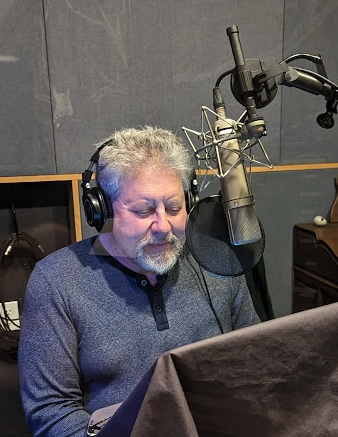Audiobook narration as a proofreading hack

Reading a book aloud is a great way to catch errors. Of course, no one has the patience to do that at the end of a book production process.
But you can take advantage of it if you’re narrating your own audiobook. It’s all a question of timing.
Arrange the timing of your audiobook narration session at the very tail end of your book’s page layout and production process. The pages should be at the final pass of content (because you want the text you read aloud to be final.) But there should still be a few days before the final to-printer deadline. This gives you time to fix errors in the final pages.
Narration is a form of quality control
When you narrate an audiobook, there is typically a sound engineer or audio producer listening. The engineer makes sure you read what’s actually on the page (as opposed to what your brain thinks is on the page). And you, the author, also notice things you’ve missed in previous reviews. Here are the kinds of things may have slipped through all your previous quality passes, but that you may catch at this stage:
- Small missing words like “in” and “the.”
- Singular/plural agreement errors.
- Inconsistencies in terminology, grammar, or spelling.
- Ill-formed sentences where the first part doesn’t match the last part.
It’s no coincidence that these are the most minor and local of errors — they’re the typos that somehow made it past all of your quality checks, your copy editor, your proofreader, and your page layout people.
Luckily, they’re so small that fixing them is unlikely to disrupt the rest of the content.
If the timing is off . . .
Most book processes don’t allow for an extra few days of waiting while you read the book aloud. As a result, your narration is likely to take place after the to-printer deadline.
Make note of errors anyway. You can still change the ebook. If the book is print-on-demand, you can update the text. And if it’s traditionally printed, you can get the edits into the next printing.
Here’s hoping you don’t find anything too embarrassing.
When you were narrating your book, did you catch yourself applying the wrong inflection–say, the temporal now for the nontemporal now in “Now, you might think that…”? If so, did you ask to start again?
It always troubles me when the narrator/actor clearly gets it wrong but their editor or sound engineer doesn’t have them redo it.
Recently, I watched a YouTube ad that features actress Jane Fonda. Here’s how she inflected her words:
“They SAY, ‘You can’t.’
“WE say, ‘You can.'”
Clearly it was written to be said this way:
“THEY say, ‘You can’t.’
“WE say, ‘You can.'”
100%.
I’ve given my narrators final versions of my book that I thought were bulletproof. I’ll then see a few updates in Notion that they found small issues. Great advice.
Even if you aren’t narrating a book, reading aloud is still the best proofing method.
I rerecorded several passages due to issues like that. I could them right after I read them aloud — the engineer wasn’t the quality control, I was. As the author, I knew how I wanted things to sound.
True. For an article, that’s viable. But few have the patience to do it for an entire book — unless they’re creating an audio recording.